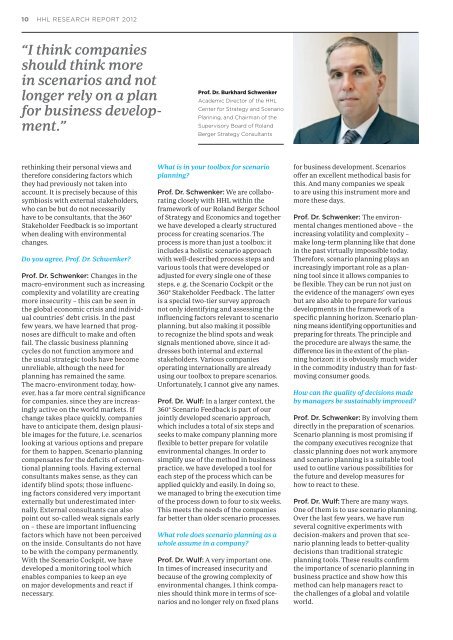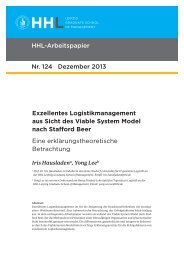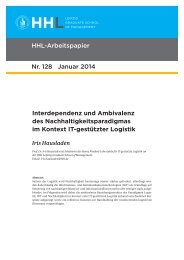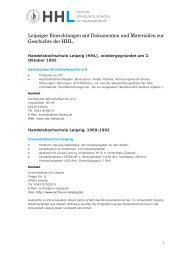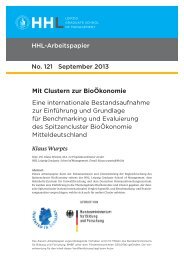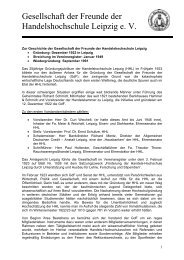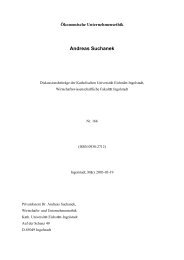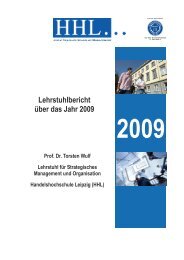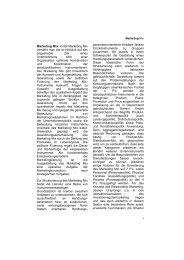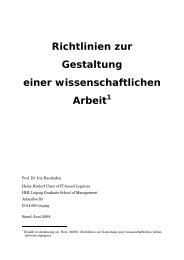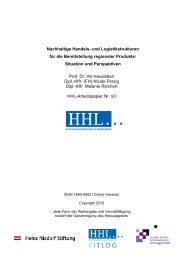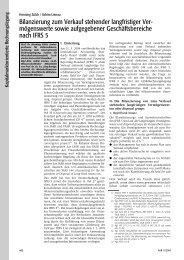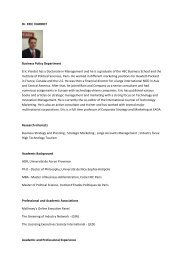Bio- and regenera- tive Medicine as an important growth Market
Bio- and regenera- tive Medicine as an important growth Market
Bio- and regenera- tive Medicine as an important growth Market
Create successful ePaper yourself
Turn your PDF publications into a flip-book with our unique Google optimized e-Paper software.
10 HHL RESEARCH REPORT 2012 STRATEgiC And inTERnATiOnAL MAnAgEMEnT 11<br />
“I think comp<strong>an</strong>ies<br />
should think more<br />
in scenarios <strong><strong>an</strong>d</strong> not<br />
longer rely on a pl<strong>an</strong><br />
for business development.”<br />
rethinking their personal views <strong><strong>an</strong>d</strong><br />
therefore considering factors which<br />
they had previously not taken into<br />
account . It is precisely because of this<br />
symbiosis with external stakeholders,<br />
who c<strong>an</strong> be but do not necessarily<br />
have to be consult<strong>an</strong>ts, that the 360°<br />
Stakeholder Feedback is so import<strong>an</strong>t<br />
when dealing with environmental<br />
ch<strong>an</strong>ges .<br />
Do you agree, Prof. Dr. Schwenker?<br />
Prof. Dr. Schwenker: Ch<strong>an</strong>ges in the<br />
macro-environment such <strong>as</strong> incre<strong>as</strong>ing<br />
complexity <strong><strong>an</strong>d</strong> volatility are creating<br />
more insecurity – this c<strong>an</strong> be seen in<br />
the global economic crisis <strong><strong>an</strong>d</strong> individual<br />
countries’ debt crisis . In the p<strong>as</strong>t<br />
few years, we have learned that prognoses<br />
are difficult to make <strong><strong>an</strong>d</strong> often<br />
fail . The cl<strong>as</strong>sic business pl<strong>an</strong>ning<br />
cycles do not function <strong>an</strong>ymore <strong><strong>an</strong>d</strong><br />
the usual strategic tools have become<br />
un reliable, although the need for<br />
pl<strong>an</strong>ning h<strong>as</strong> remained the same .<br />
The macro-environment today, however,<br />
h<strong>as</strong> a far more central signific<strong>an</strong>ce<br />
for comp<strong>an</strong>ies, since they are incre<strong>as</strong>ingly<br />
ac<strong>tive</strong> on the world markets . If<br />
ch<strong>an</strong>ge takes place quickly, comp<strong>an</strong>ies<br />
have to <strong>an</strong>ticipate them, design plausible<br />
images for the future, i .e . scenarios<br />
looking at various options <strong><strong>an</strong>d</strong> prepare<br />
for them to happen . Scenario pl<strong>an</strong>ning<br />
compensates for the deficits of conventional<br />
pl<strong>an</strong>ning tools . Having external<br />
consult<strong>an</strong>ts makes sense, <strong>as</strong> they c<strong>an</strong><br />
identify blind spots; those influencing<br />
factors considered very import<strong>an</strong>t<br />
externally but underestimated internally<br />
. External consult<strong>an</strong>ts c<strong>an</strong> also<br />
point out so-called weak signals early<br />
on – these are import<strong>an</strong>t influencing<br />
factors which have not been perceived<br />
on the inside . Consult<strong>an</strong>ts do not have<br />
to be with the comp<strong>an</strong>y perm<strong>an</strong>ently .<br />
With the Scenario Cockpit, we have<br />
developed a monitoring tool which<br />
enables comp<strong>an</strong>ies to keep <strong>an</strong> eye<br />
on major developments <strong><strong>an</strong>d</strong> react if<br />
necessary .<br />
Prof. Dr. Burkhard Schwenker<br />
Academic Director of the HHL<br />
Center for Strategy <strong><strong>an</strong>d</strong> Scenario<br />
Pl<strong>an</strong>ning, <strong><strong>an</strong>d</strong> Chairm<strong>an</strong> of the<br />
Supervisory Board of Rol<strong><strong>an</strong>d</strong><br />
Berger Strategy Consult<strong>an</strong>ts<br />
What is in your toolbox for scenario<br />
pl<strong>an</strong>ning?<br />
Prof. Dr. Schwenker: We are collaborating<br />
closely with HHL within the<br />
framework of our Rol<strong><strong>an</strong>d</strong> Berger School<br />
of Strategy <strong><strong>an</strong>d</strong> Economics <strong><strong>an</strong>d</strong> together<br />
we have developed a clearly structured<br />
process for creating scenarios . The<br />
process is more th<strong>an</strong> just a toolbox: it<br />
includes a holistic scenario approach<br />
with well-described process steps <strong><strong>an</strong>d</strong><br />
various tools that were developed or<br />
adjusted for every single one of these<br />
steps, e .g . the Scenario Cockpit or the<br />
360° Stakeholder Feedback . The latter<br />
is a special two-tier survey approach<br />
not only identifying <strong><strong>an</strong>d</strong> <strong>as</strong>sessing the<br />
influencing factors relev<strong>an</strong>t to scenario<br />
pl<strong>an</strong>ning, but also making it possible<br />
to recognize the blind spots <strong><strong>an</strong>d</strong> weak<br />
signals mentioned above, since it addresses<br />
both internal <strong><strong>an</strong>d</strong> external<br />
stakeholders . Various comp<strong>an</strong>ies<br />
operating internationally are already<br />
using our toolbox to prepare scenarios .<br />
Unfortunately, I c<strong>an</strong>not give <strong>an</strong>y names .<br />
Prof. Dr. Wulf: In a larger context, the<br />
360° Scenario Feedback is part of our<br />
jointly developed scenario approach,<br />
which includes a total of six steps <strong><strong>an</strong>d</strong><br />
seeks to make comp<strong>an</strong>y pl<strong>an</strong>ning more<br />
flexible to better prepare for volatile<br />
environmental ch<strong>an</strong>ges . In order to<br />
simplify use of the method in business<br />
practice, we have developed a tool for<br />
each step of the process which c<strong>an</strong> be<br />
applied quickly <strong><strong>an</strong>d</strong> e<strong>as</strong>ily . In doing so,<br />
we m<strong>an</strong>aged to bring the execution time<br />
of the process down to four to six weeks .<br />
This meets the needs of the comp<strong>an</strong>ies<br />
far better th<strong>an</strong> older scenario processes .<br />
What role does scenario pl<strong>an</strong>ning <strong>as</strong> a<br />
whole <strong>as</strong>sume in a comp<strong>an</strong>y?<br />
Prof. Dr. Wulf: A very import<strong>an</strong>t one .<br />
In times of incre<strong>as</strong>ed insecurity <strong><strong>an</strong>d</strong><br />
because of the growing complexity of<br />
environmental ch<strong>an</strong>ges, I think comp<strong>an</strong>ies<br />
should think more in terms of scenarios<br />
<strong><strong>an</strong>d</strong> no longer rely on fixed pl<strong>an</strong>s<br />
for business development . Scenarios<br />
offer <strong>an</strong> excellent methodical b<strong>as</strong>is for<br />
this . And m<strong>an</strong>y comp<strong>an</strong>ies we speak<br />
to are using this instrument more <strong><strong>an</strong>d</strong><br />
more these days .<br />
Prof. Dr. Schwenker: The environmental<br />
ch<strong>an</strong>ges mentioned above – the<br />
incre<strong>as</strong>ing volatility <strong><strong>an</strong>d</strong> complexity –<br />
make long-term pl<strong>an</strong>ning like that done<br />
in the p<strong>as</strong>t virtually impossible today .<br />
Therefore, scenario pl<strong>an</strong>ning plays <strong>an</strong><br />
incre<strong>as</strong>ingly import<strong>an</strong>t role <strong>as</strong> a pl<strong>an</strong>ning<br />
tool since it allows comp<strong>an</strong>ies to<br />
be flexible . They c<strong>an</strong> be run not just on<br />
the evidence of the m<strong>an</strong>agers’ own eyes<br />
but are also able to prepare for various<br />
developments in the framework of a<br />
specific pl<strong>an</strong>ning horizon . Scenario pl<strong>an</strong>ning<br />
me<strong>an</strong>s identifying opportunities <strong><strong>an</strong>d</strong><br />
preparing for threats . The principle <strong><strong>an</strong>d</strong><br />
the procedure are always the same, the<br />
difference lies in the extent of the pl<strong>an</strong>ning<br />
horizon: it is obviously much wider<br />
in the commodity industry th<strong>an</strong> for f<strong>as</strong>tmoving<br />
consumer goods .<br />
How c<strong>an</strong> the quality of decisions made<br />
by m<strong>an</strong>agers be sustainably improved?<br />
Prof. Dr. Schwenker: By involving them<br />
directly in the preparation of scenarios .<br />
Scenario pl<strong>an</strong>ning is most promising if<br />
the comp<strong>an</strong>y execu<strong>tive</strong>s recognize that<br />
cl<strong>as</strong>sic pl<strong>an</strong>ning does not work <strong>an</strong>ymore<br />
<strong><strong>an</strong>d</strong> scenario pl<strong>an</strong>ning is a suitable tool<br />
used to outline various possibilities for<br />
the future <strong><strong>an</strong>d</strong> develop me<strong>as</strong>ures for<br />
how to react to these .<br />
Prof. Dr. Wulf: There are m<strong>an</strong>y ways .<br />
One of them is to use scenario pl<strong>an</strong>ning .<br />
Over the l<strong>as</strong>t few years, we have run<br />
several cogni<strong>tive</strong> experiments with<br />
decision-makers <strong><strong>an</strong>d</strong> proven that scenario<br />
pl<strong>an</strong>ning leads to better-quality<br />
decisions th<strong>an</strong> traditional strategic<br />
pl<strong>an</strong>ning tools . These results confirm<br />
the import<strong>an</strong>ce of scenario pl<strong>an</strong>ning in<br />
business practice <strong><strong>an</strong>d</strong> show how this<br />
method c<strong>an</strong> help m<strong>an</strong>agers react to<br />
the challenges of a global <strong><strong>an</strong>d</strong> volatile<br />
world .<br />
center For StrategY <strong><strong>an</strong>d</strong> Scenario pl<strong>an</strong>ning<br />
europe<strong>an</strong><br />
aviation<br />
industry<br />
While air travel w<strong>as</strong> mostly open to only<br />
the upper cl<strong>as</strong>ses in the l<strong>as</strong>t century<br />
due to high prices, globalization today<br />
requires a high level of f<strong>as</strong>t <strong><strong>an</strong>d</strong> re<strong>as</strong>onably<br />
priced freight tr<strong>an</strong>sport worldwide<br />
. This comes with opportunities for<br />
the airlines in the form of <strong>growth</strong> but<br />
also causes problems: new technologies,<br />
the disappear<strong>an</strong>ce of economic<br />
boundaries <strong><strong>an</strong>d</strong> regulations leading<br />
to falling prices – <strong><strong>an</strong>d</strong> therefore to the<br />
establishment of new low-cost carriers<br />
such <strong>as</strong> Ry<strong>an</strong>air, Air Berlin or e<strong>as</strong>yJet .<br />
Therefore, the Center for Strategy <strong><strong>an</strong>d</strong><br />
Scenario Pl<strong>an</strong>ning under the leadership<br />
of Prof . Dr . Torsten Wulf prepared<br />
four future scenarios for the Europe<strong>an</strong><br />
aviation industry within the framework<br />
of a study . They center around<br />
two major factors of insecurity: regulation<br />
within the industry <strong><strong>an</strong>d</strong> customer<br />
price sensitivity . The authors firstly<br />
recommend further restructuring <strong><strong>an</strong>d</strong><br />
incre<strong>as</strong>es in efficiency to put the brakes<br />
on growing costs in administration <strong><strong>an</strong>d</strong><br />
processes . Secondly, more service <strong><strong>an</strong>d</strong><br />
quality through innovation both in the<br />
air <strong><strong>an</strong>d</strong> on the ground to remain competi<strong>tive</strong><br />
with Asi<strong>an</strong> low-cost carriers .<br />
Since foreign airlines entering the<br />
Europe<strong>an</strong> market limit the <strong>growth</strong> of<br />
the EU airlines, institutions on national<br />
<strong><strong>an</strong>d</strong> international levels are called<br />
upon to examine the adv<strong>an</strong>tages <strong><strong>an</strong>d</strong><br />
disadv<strong>an</strong>tages of the liberalization .<br />
“Detailed strategic recommendations,<br />
however, c<strong>an</strong> only be provided on the<br />
b<strong>as</strong>is of the specific situation in the<br />
respec<strong>tive</strong> comp<strong>an</strong>y,” according to<br />
Prof . Dr . Wulf . He regards the scenarios<br />
prepared <strong>as</strong> a starting point to develop<br />
comp<strong>an</strong>y-specific strategies <strong><strong>an</strong>d</strong> action<br />
pl<strong>an</strong>s for the Europe<strong>an</strong> airlines in<br />
this highly dynamic environment .<br />
www.scenariom<strong>an</strong>agement.de<br />
cHair oF Strategic M<strong>an</strong>ageMent <strong><strong>an</strong>d</strong> org<strong>an</strong>iZation<br />
Family equity:<br />
Shareholding from<br />
Family <strong>as</strong>sets<br />
coMp<strong>an</strong>Y<br />
FaMilY eQuitY<br />
<strong>as</strong>set M<strong>an</strong>agement of the Family<br />
When investing their private capital,<br />
entrepreneurial families often build<br />
on other comp<strong>an</strong>ies . It is not about<br />
speculation <strong><strong>an</strong>d</strong> the pl<strong>an</strong>ned repurch<strong>as</strong>e<br />
with a high yield but about maintaining<br />
the indirect influence on the <strong>as</strong>sets<br />
invested <strong><strong>an</strong>d</strong> the possibility to continue<br />
to act <strong>as</strong> <strong>an</strong> entrepreneur . This is the<br />
conclusion drawn by the “Family<br />
Equity: Shareholding from Family<br />
Assets” study . Entrepreneurial families<br />
therefore <strong>as</strong>sume <strong>an</strong> incre<strong>as</strong>ingly<br />
pax SHare oF BuSineSS<br />
<strong><strong>an</strong>d</strong> econoMY claSS<br />
MarKet SHare oF intra<br />
europe<strong>an</strong> capacitY<br />
15 %<br />
30%<br />
MarKet SHare oF MediuM-<br />
<strong><strong>an</strong>d</strong> long-Haul capacitY<br />
30%<br />
15 %<br />
55%<br />
15 %<br />
40 %<br />
5%<br />
BuSineSS<br />
95%<br />
econoMY<br />
low-coSt<br />
carrier<br />
europe<strong>an</strong><br />
networK<br />
carrier<br />
otHer eu<br />
carrier<br />
aSi<strong>an</strong> <strong><strong>an</strong>d</strong><br />
Middle eaSt<br />
carrier<br />
row carrier<br />
europe<strong>an</strong><br />
networK<br />
carrier<br />
eu low-coSt<br />
<strong><strong>an</strong>d</strong> otHer<br />
carrier<br />
ac<strong>tive</strong> role <strong>as</strong> shareholders . “As a final<br />
conclusion we c<strong>an</strong> say that family<br />
businesses <strong><strong>an</strong>d</strong>/or entrepreneurial<br />
families differ from institutional investors<br />
with regards to shareholding in<br />
other comp<strong>an</strong>ies,” explains Prof . Dr .<br />
Torsten Wulf . He is one of the authors<br />
of the study compiled in cooperation<br />
with AlphaZirkel (Forum for Family<br />
Entrepreneurs) . Prof . Dr . Wulf expects<br />
the trend of incre<strong>as</strong>ing direct shareholding<br />
by comp<strong>an</strong>ies to continue in the<br />
future: “Entrepreneurial families will<br />
play a more <strong><strong>an</strong>d</strong> more import<strong>an</strong>t role<br />
<strong>as</strong> capital providers <strong><strong>an</strong>d</strong> partners .”<br />
If the guiding principle of entrepreneurial<br />
families continue in their<br />
shareholdings, adv<strong>an</strong>tages <strong><strong>an</strong>d</strong> disadv<strong>an</strong>tages<br />
arise . These are to be <strong>an</strong>alyzed<br />
in a subsequent paper . Additionally,<br />
the question whether entrepreneurial<br />
families are the more successful investors<br />
in shareholdings is to be addressed .


